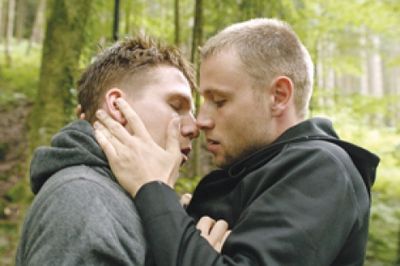“Free Fall is a movie I’m really proud of,” says Hanno Koffler, who starred in the film about forbidden love between two male police cadets. Dubbed Germany’s answer to Brokeback Mountain, the movie was recently released onto DVD. “It was intensive work,” Koffler said.
Directed by Stephan Lacant in his feature-film debut, Free Fall (Freier Fall) introduces us to Marc Borgmann, a young police officer played by Koffler. With a longtime girlfriend, a promising law enforcement career, and a child on the way, Marc seems to have his whole life planned out for him — that is, until Kay Engel (played by Max Riemelt) steps into his life when the two become roommates at the police academy.
Initially, Marc is annoyed by Kay’s loose-cannon ways and his disrespect for the established hierarchy. Eventually though, they begin taking runs together, and this brings a breath of fresh air into Marc’s life. For the first time, he develops feelings for a man. (“Ever thought of just leaving it all behind? Taking off and starting over?” Kay asks Marc at one point.)
Complicating things further is that once Marc is back at his local precinct, he learns that Kay has transferred there. By the time Marc’s baby boy arrives, Kay is very much in love with his colleague, and in his frustration, he takes to acting in self-destructive ways. Meanwhile, Marc is torn between the life he knows and his feelings for the enigmatic Kay, and he finds himself in the emotional free fall of the title. He is unable to make anyone happy, least of all himself.
Koffler may be best known in the United States for his role in the 2004 LGBT drama Summer Storm. Of Germany’s attitudes toward the LGBT community in general, he observes, “It kind of depends on where you are. … If you are in big cities, it’s not that big a deal. The people are more open-minded. But if you are in the provinces, then it’s much harder to be as open.”
For this reason, both he and Lacant felt that it was particularly important to address this “more provincial” attitude in the setting where their story takes place.
“We thought about which audience we wanted to do the movie for, and we made the decision that our aim was that people in the villages and provinces should be interested also to see it,” Koffler said. “So for us, it was really important that we not set it in a big city like Berlin or somewhere. Stephan purposely made the decision that the whole story take place in small-town Germany.”
For some in the United States , the attitudes portrayed in the film — especially the shock of those around the pair once they’re found out — are more familiar than we may like to believe.
“In Germany, it’s not easy to make the decision to play a gay character in a movie,” Koffler said. “I heard that some of my colleagues got the chance to play Kay and they said no because they were afraid to have something of a stigma by playing a gay character. And that shows us that our whole business — like our whole society — isn’t so free as we’d like to believe. I thought about this too, but in the end it was something I was really interested to do. For me, it was not about the sexuality, but to try and get inside of the character.”
Lacant echoes these thoughts, acknowledging that it indeed “took a long time to find the right actors,” but once they were found, he couldn’t have been more pleased.
He said that Marc, as the story’s central character, was the one they initially focused on.
“We found Hanno first, and afterwards we tried him out with a lot of different Kays, and once Max Riemelt [known for 2004’s Napola: Before the Fall> came in, the casting was just blowing our minds — already there was such an energy between these two!” Lacant said. “In the end, we knew they had to play these parts!”
 
